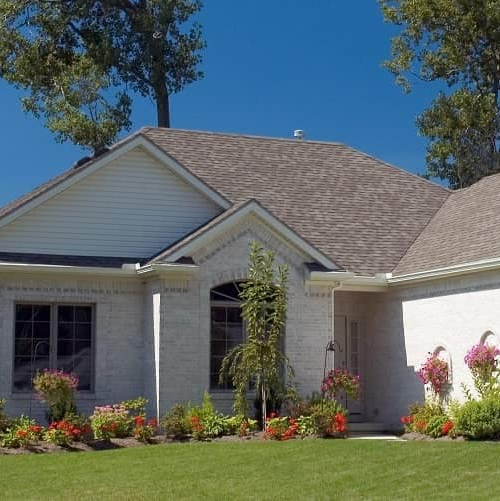Condo vs. house: Which is best for you?
Contributed by Tom McLean
Oct 30, 2025
•5-minute read

Saving enough to be ready to buy a home is a major accomplishment, but it comes with some big decisions to make. One of the most important decisions is whether to buy a condo or a house. A condo will require less maintenance, but a house offers more privacy and maybe a higher resale value. Let’s explore the differences to help you decide which is right for you.
Costs
When it comes to the cost of buying a condo vs. home, there are significant differences. Let’s break them down.
Purchase price
In many markets, condos are more affordable than single-family houses.
According to Redfin®, the median sales price for a condo in May 2025 was $354,100, while the median sale price for a single-family home was $462,206. That’s a significant difference. For some aspiring homeowners, it may mean the difference between affording to buy and continuing to rent.
While condos typically cost less up front, there are condo-specific costs and fees that narrow the overall cost compared with a house. Let’s look at some common fees for condos vs. houses.
Condo association fees
When you buy a condo, you own the interior of a unit inside a larger building or complex. The condo association, which is similar to and sometimes referred to as a homeowners association, is responsible for maintaining the exterior of the building as well as common areas and amenities such as parking, exercise facilities, or a swimming pool.
Every condo owner in the building or complex must pay fees to the association to pay for these community services. The average HOA fee nationwide is nearly $300 – that’s about $3,600 a year. This fee can vary widely, depending on the amenities of your community.
While most condos belong to a condo association, most houses do not.
HOA fees are typically lower than condo association fees because, unlike condos, HOAs usually don’t pay costs like painting the exterior of an individual house or maintaining its landscaping.
Maintenance costs
Home maintenance costs can differ greatly. Generally, houses cost more to maintain than condos. This is because the owner of a house is responsible for costs that condo owners typically are not. Here are a few examples:
- Roof replacement, which costs about $9,500 on average.
- HVAC replacement, which costs about $7,500 on average.
- Exterior painting, which costs about $3,200 on average.
Property taxes and insurance
Because property taxes are based on the value of your house or condo, and condos are typically less expensive, property taxes on condos usually cost less.
When it comes to homeowners insurance, condos are, on average, less expensive to insure than houses.
The average cost of condo insurance in 2023 was $506 per year, compared with $1,754 for homeowners insurance.
Maintenance and repairs
There’s a major difference between owning a house and owning a condo when it comes to maintenance and responsibilities.
Condo owners are only responsible for interior maintenance, such as floors, appliances, and fixtures. Their condo association dues pay for exterior and common area maintenance and repairs.
It’s not uncommon for a special assessment to be imposed if your condo building or complex needs a significant repair or major upgrade. And not all condo developments are created equal, so it’s important to read the association bylaws and regulations to fully understand what’s covered and what’s not.
Owning a house typically comes with more responsibility. You own the land, the roof, and the exterior of the house, as well as the interior. You own the responsibility of keeping all these elements in good repair.
Your choice of a condo vs. house will affect both how much you pay for insurance as well as how much time, effort, and money is required for repairs and maintenance. If you prefer the freedom to “lock it and leave it,” a condo might be best.
Lifestyle considerations
A condo is part of a community and can provide access to amenities such as swimming pools, gyms, rooftop decks, and private parks. They also can offer gated entry, private streets, and parking.
The tradeoffs include sharing walls and common spaces with neighbors and needing to follow rules and restrictions on how you can use your property.
With houses, you have more freedom. You want to paint your home purple and give your yard a drought tolerant cactus theme? Go for it. You’ll also typically enjoy more privacy, have more space, and can expand and renovate your home within local regulations.
The downside, of course, is fewer amenities, more upkeep, and probably higher maintenance costs.
Resale value
A home is not just a place to live – it’s a major investment and potential wealth-building tool. But when comparing a condo vs. a single-family home, they don’t always appreciate equally.
Houses, particularly single-family homes, tend to appreciate faster than condos. Condos can be more sensitive to market fluctuations. In May of 2025, Redfin reported that condo sales were down 11.9% from the year before, compared with a 3.7% drop in single-family home sales.
However, the factors that contribute to appreciation are many, of which the type of property is only one. Location, condition, school district, local or nearby amenities, market trends, and many other factors can affect desirability and appreciation.
FAQ
Here are answers to common questions about buying a condo vs. buying a house.
Are condos easier to maintain than houses?
Generally, yes. With a condo you are usually not responsible for exterior maintenance or repairs. Your condo association dues often cover things like lawn care, exterior paint, roofs, common areas, and more. With a single-family home, you are responsible for all these things.
Do condos appreciate like houses?
Yes, but typically not as quickly as single-family houses. However, there are many factors that determine a property’s appreciation. Location, market trends, amenities, HOA quality, and more can matter as much as if not more than the type of property.
Can I customize my condo unit?
Interior changes such as flooring, cabinets, and wall colors are generally fine. However, exterior changes, such as painting, landscaping, or even outdoor storage, are often regulated by the condo association. This is why it’s vital to read the association bylaws and restrictions before buying a condo.
Are HOA fees tax-deductible?
Sometimes. Condo association or HOA fees are not deductible if your condo is your primary residence with no business use. They may be deductible if the condo is a rental property or used in part for your business. However, this is a very nuanced area, and it’s best to consult a tax professional.
The bottom line: Consider all the factors when choosing a condos or house
Is buying a condo or house better? If you desire more privacy, room, potentially faster appreciation, and don’t mind the extra responsibility, a house might suit you best. If you prefer paying a monthly condo association fee to not worry about lawn care, roof repair, or other exterior maintenance, and want amenities at the expense of a potentially higher loan interest rate, a condo might be a better fit.
Either way, it’s always best to consult a real estate professional to get a clear picture of the market in your area. A great first step is to begin the preapproval process with Rocket Mortgage®.

Terence Loose
Related resources

7-minute read
Condo loans defined and explained
Planning to purchase a condominium? Discover how condo loans may differ from conventional home mortgages so you can have a smooth home buying experience.
Read more
8-minute read
Condo vs. co-op: Pros, cons and major differences
Choosing between a condo and a co-op depends on what kind of lifestyle you want to enjoy. Weigh the pros and cons to see which is right for you.
Read more

10-minute read
Checklist for buying your first house
The process of buying a home can be complicated, especially for first-time buyers. Make it simpler with this house buying checklist.
Read more